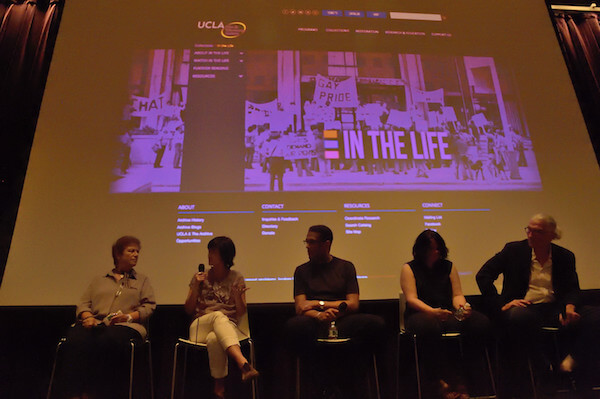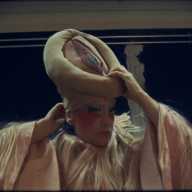Terry Baum as Lorena Hickok. ” | LYNNE FRIED
BY DUNCAN OSBORNE | Talking to the Oregonian last year, Ken Burns said his 14-hour documentary, “The Roosevelts: An Intimate History,” was just that, “an intimate history, not a tabloid history.”
So whether Eleanor Roosevelt had a relationship with journalist Lorena Hickok (as in were they in love and having sex?) is something “We don’t know,” Burns said. “And the more I know about her, the more I think the answer is, probably not. She had close women friends, and close male friends. Some of those female friends were women who were committed to other women.”
Terry Baum doesn’t beg to differ — she knows Hickok and Eleanor were lovers.
“The evidence is out there, but people are ignoring it because they think it besmirches Eleanor’s reputation, but I think she had the guts, the courage to live her life,” Baum told Gay City News in a phone interview from San Francisco, where she lives. “It’s truly amazing, it’s an amazing story.”
After a successful run in San Francisco, Baum will be performing her one-woman show, “Hick: A Love Story, The Romance of Lorena Hickok and Eleanor Roosevelt,” at the 19th Annual New York International Fringe Festival, beginning on August 14. She will have five shows during the festival.
The basis for “Hick” was a play written by Pat Bond, a friend of Baum’s who passed away in 1990. Bond “had a huge crush” on Eleanor, Baum said. Baum read a dozen books on Eleanor and performed additional research at the Franklin D. Roosevelt Presidential Library and Museum in Hyde Park, NY. This included reading some of the more than 3,500 letters exchanged between Eleanor and Hickok.
“I didn’t read all of those,” Baum said. “Frankly, Eleanor’s handwriting is impossible to read.”
Several hundred out of the thousands are noted as being particularly intimate. Some letters were destroyed.
“Hick burned a certain number, we have no idea how many, so maybe those were more explicit or revealing,” Baum said.
“Hick” was the result of all this research. The San Francisco Examiner called it a “compelling one-
woman show thoroughly researched, written and performed by Terry Baum.” There were similar raves from other Bay Area publications.
“The sexual relationship went on for three to five years,” Baum said. “The deep friendship continued for 30 years.”
The play was a departure for Baum who has typically based her work on her “personal experience, but fictionalized,” she said.
“I never wrote a historical play before,” Baum said.
In 2013, Baum toured South Africa performing her play, “Lesbo Solo!” In 2008, she performed her play, “Immediate Family,” to raise cash for the battle against Prop. 8, a ballot initiative that banned same sex marriage in California. Prop. 8 was overturned in a federal lawsuit in 2010. She is also a founder (with Charlotte Colavin and Shelley Fields) of the Lilith Theater in Berkeley, a women’s theatre group that was active in the '70s and '80s. With a long career in the theater, Baum has other credits.
“I think ‘actress’ is very glamorous,” Baum said of herself. “I would say I consider myself a playwright first…I’ve been in the theater my whole life.”
Baum also took time out to dabble in San Francisco politics. She ran for mayor of San Francisco in 2011, and in 2004 she challenged Nancy Pelosi in a run for Congress.
“She was shaking in her Guccis,” Baum said of Pelosi. “Both times I was supported by the Green Party.”
Hickok struck a particular chord with Baum. She is clearly impressed by the depth of the relationship Hickok and Eleanor had, and she is just as impressed by the sacrifices Hickok made for Eleanor.
“She really was the most famous woman journalist of the day,” Baum said. “That was not what she chose. She chose Eleanor. To me that’s extremely compelling. This is part of our history as the gay and lesbian community. That’s important for everyone to know.”
Baum said that Hickok made significant sacrifices in her career to advance Eleanor’s career.
“She is actually the first person who conceived of Eleanor as a public figure,” Baum said. “She really mentored Eleanor in her relations with the press and many of Eleanor’s ideas were actually Hick’s ideas…Hick was really instrumental in teaching Eleanor how to utilize the media to get her message out. She also edited Eleanor’s articles for magazines.”
In “The Roosevelts: An Intimate History,” which aired on PBS, Burns spent a fair amount of time discussing Franklin Roosevelt’s relationship with Lucy Mercer, an affair that led to Eleanor offering him a divorce. His resistance to exploring Eleanor’s relationship with Hickok has been noted in a number of LGBT and mainstream press outlets. To an extent, Baum offers “Hick” to counter Burns’ denial and that of other historians.
“It’s just an amazing story about two incredible women,” Baum said. “Doing the play counteracts people like Ken Burns and also Doris Kearns Goodwin…The sum total of it is obvious, but there are also smoking guns. They had a wonderful, playful relationship. It was deep.”
And Baum is not above suggesting that good old-fashioned prejudice may be a work.
“The idea that Eleanor had a lesbian relationship is fodder for tabloids,” she said. “Obviously, there’s unconscious homophobia underlying that. There’s no getting around that.”






































